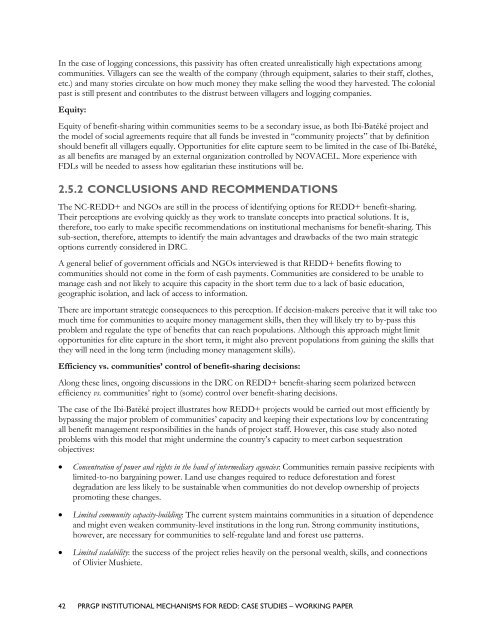Institutional Mechanisms for REDD+ - Case Studies Working Paper
Institutional Mechanisms for REDD+ - Case Studies Working Paper
Institutional Mechanisms for REDD+ - Case Studies Working Paper
You also want an ePaper? Increase the reach of your titles
YUMPU automatically turns print PDFs into web optimized ePapers that Google loves.
In the case of logging concessions, this passivity has often created unrealistically high expectations among<br />
communities. Villagers can see the wealth of the company (through equipment, salaries to their staff, clothes,<br />
etc.) and many stories circulate on how much money they make selling the wood they harvested. The colonial<br />
past is still present and contributes to the distrust between villagers and logging companies.<br />
Equity:<br />
Equity of benefit-sharing within communities seems to be a secondary issue, as both Ibi-Batéké project and<br />
the model of social agreements require that all funds be invested in ―community projects‖ that by definition<br />
should benefit all villagers equally. Opportunities <strong>for</strong> elite capture seem to be limited in the case of Ibi-Batéké,<br />
as all benefits are managed by an external organization controlled by NOVACEL. More experience with<br />
FDLs will be needed to assess how egalitarian these institutions will be.<br />
2.5.2 CONCLUSIONS AND RECOMMENDATIONS<br />
The NC-<strong>REDD+</strong> and NGOs are still in the process of identifying options <strong>for</strong> <strong>REDD+</strong> benefit-sharing.<br />
Their perceptions are evolving quickly as they work to translate concepts into practical solutions. It is,<br />
there<strong>for</strong>e, too early to make specific recommendations on institutional mechanisms <strong>for</strong> benefit-sharing. This<br />
sub-section, there<strong>for</strong>e, attempts to identify the main advantages and drawbacks of the two main strategic<br />
options currently considered in DRC.<br />
A general belief of government officials and NGOs interviewed is that <strong>REDD+</strong> benefits flowing to<br />
communities should not come in the <strong>for</strong>m of cash payments. Communities are considered to be unable to<br />
manage cash and not likely to acquire this capacity in the short term due to a lack of basic education,<br />
geographic isolation, and lack of access to in<strong>for</strong>mation.<br />
There are important strategic consequences to this perception. If decision-makers perceive that it will take too<br />
much time <strong>for</strong> communities to acquire money management skills, then they will likely try to by-pass this<br />
problem and regulate the type of benefits that can reach populations. Although this approach might limit<br />
opportunities <strong>for</strong> elite capture in the short term, it might also prevent populations from gaining the skills that<br />
they will need in the long term (including money management skills).<br />
Efficiency vs. communities’ control of benefit-sharing decisions:<br />
Along these lines, ongoing discussions in the DRC on <strong>REDD+</strong> benefit-sharing seem polarized between<br />
efficiency vs. communities‘ right to (some) control over benefit-sharing decisions.<br />
The case of the Ibi-Batéké project illustrates how <strong>REDD+</strong> projects would be carried out most efficiently by<br />
bypassing the major problem of communities‘ capacity and keeping their expectations low by concentrating<br />
all benefit management responsibilities in the hands of project staff. However, this case study also noted<br />
problems with this model that might undermine the country‘s capacity to meet carbon sequestration<br />
objectives:<br />
� Concentration of power and rights in the hand of intermediary agencies: Communities remain passive recipients with<br />
limited-to-no bargaining power. Land use changes required to reduce de<strong>for</strong>estation and <strong>for</strong>est<br />
degradation are less likely to be sustainable when communities do not develop ownership of projects<br />
promoting these changes.<br />
� Limited community capacity-building: The current system maintains communities in a situation of dependence<br />
and might even weaken community-level institutions in the long run. Strong community institutions,<br />
however, are necessary <strong>for</strong> communities to self-regulate land and <strong>for</strong>est use patterns.<br />
� Limited scalability: the success of the project relies heavily on the personal wealth, skills, and connections<br />
of Olivier Mushiete.<br />
42 PRRGP INSTITUTIONAL MECHANISMS FOR REDD: CASE STUDIES – WORKING PAPER

















